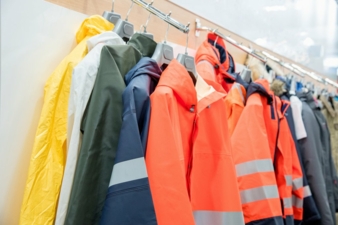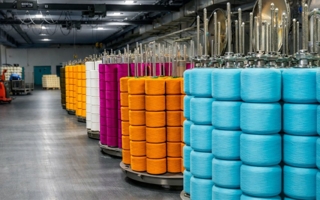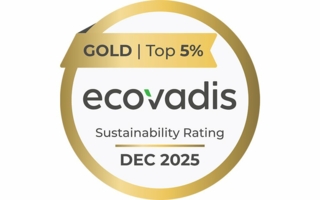14/08/2019 – Textile chemistry and then what? — auf Deutsch lesen
Sustainability with Kreussler Textile Care
When we hear the word “textile chemistry”, we often think of the chemicals used in the production of textiles. But they also have an important role to play in the post-production phase.
This is particularly true when it comes to the washing, wet and dry cleaning of apparel endowed with protective functions through special treatments, such as outdoor jackets with waterproofing, or workwear that protects against aggressive substances and fire. In such instances, textile chemistry ensures not only that soiling is thoroughly removed but also that the corresponding protective functions are not impaired or are re-activated after washing.
Consolidating these two goals often poses something of a challenge.
For example, stains on clothing with reflector stripes cannot be removed using conventional methods because their sensitive surface would otherwise be damaged by high levels of alkalinity and aggressive surfactants. As a result, Kreussler Textile Care, based in Germany, has developed a product known as Derval Protect which combines specially adapted surfactants and polymers to remove oil, fat and pigment soiling without having a negative impact on the reflective function. By building up a protective layer with each wash, it becomes easier to remove stains and dirt.
Life-saving – quite literally
Maintaining the chemical and flame-retardant functions of textiles during washing, wet or dry cleaning can literally save lives. At present, a sustainable alternative to fluorocarbon resins and fluorocarbon resin polymers is yet to be found for impregnating textiles. Particularly the minor components of these substances, so-called perfluorinated surfactants (PFC), traces of which are always present, are increasingly coming under fire. PFOA (perfluorooctanoic acid), which occurs in Class C8 fluorocarbon resin polymers, has been in the firing line for some time because it is difficult to break down and is classified as bioaccumulative; the EU Commission has introduced a ban on PFOA from July 2020.
The alternative is the C6 chemistry where the polymer side chains are shorter by two C-atoms, making their minor components (PFHxA) shorter too. Compared to PFOS, PFHxA is considerably less bioaccumulative. Industry has succeeded in developing C6-FC resins with effects comparable to C8 chemistry, such as in HYDROB FC from Kreussler, which restores the impregnation of protective clothing. The product is added after washing and activated by specific drying temperatures, lending the textile water, oil and dirt-repellent properties without damaging or clogging the textile membranes.
Besides focusing on textile chemistry, the application of professional machinery and tested processes is, likewise, of great importance.
When it comes to processing different types of textile such as chemical or fire-resistant clothing, strict regulations have to be observed, e.g. the EN standard for “protective clothing against heat, fire and chemicals” or the DIN standards for high visibility clothing. For fire-fighting apparel, it is especially important to follow the production and testing guidelines for universal fire protection clothing. Household washing machines are not suitable for preserving or restoring the respective protective functions of such garments. If the functions are to be maintained properly, professional machinery with special programming is required for each respective application. With a precisely coordinated combination of textile chemistry and mechanics, the best possible cleaning process can be devised for each textile so as to preserve or reactivate its protective functions.
Kreussler Textile Care
Kreussler was established in 1912 and is a fourth-generation family-run business with two divisions: Textile Care and Pharmaceuticals. Environmentally friendly and pioneering innovations, top quality and the protection of resources are pillars of the company’s philosophy. The firm’s premium, high concentration washing detergents and auxiliaries are all free from phosphates, borates and perborates, APEO, EDTA and NTA. A sophisticated wastewater treatment system and the application of solar modules and heat exchangers for energy supply are all a reflection of the company’s sustainability concept. Its attitude towards quality and environmental awareness is confirmed by its certifications in compliance with DIN EN ISO 9001:2015 and DIN EN ISO 14001. Kreussler is a member of the German Chemical Industry Association (VCI) and is committed to the guidelines of the global Responsible Care Initiative. The company has received an award from the Hessian EcoProfit programme.
Katja Pryss




